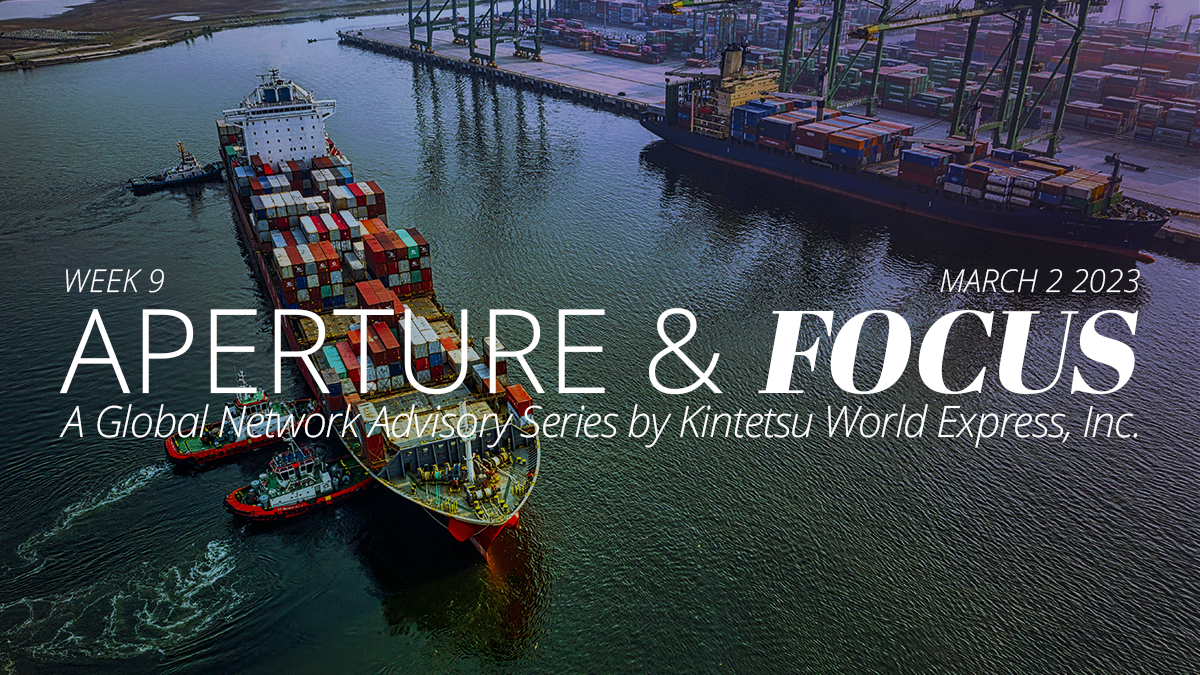Quote
Aperture & Focus 2023: Week 9

Global Aperture
As global container volumes continue to fall with the week of February 27 showing the largest decline since early December, analysts are observing rising Intra-Asia trade due to China’s reopening efforts and a high number of available empty containers at China’s seaports. A number of 24,000 TEU “megaships” that were ordered prior to global declines are scheduled to hit the waters this month just as major carriers are phasing an increasing number of ships out of their normal routes, many of them at risk of having their maiden voyages blanked. The slower air cargo market is finally showing up in capacity demand, with conversions of passenger planes to freighter planes beginning to wane. The World Trade Organization, however, expects this slowdown to be short-lived as China’s Covid restrictions continue to lift and data from the organization’s Goods Trade Barometer indicates positive trends for growth.
Regional Focus
Americas
This week’s Trans-Pacific Maritime Conference TPM23 revealed that retailers will likely face new delays that may result in late deliveries in the wake of a high number ship cancelations by major carriers that has tightened capacity in the near term. Tentative agreements between The International Longshore and Warehouse Union (ILWU) and Pacific Maritime Association (PMA) were reached on key issues, including healthcare, though an update for industry stakeholders that was published on February 23 noted that negotiations would not be made available to the public or media. Several industry executives have responded to this with concerns over work allocations between union and non-union workers and port automation, a point which the White House’s Supply-Chain Envoy addressed, assuring both sides that necessary port automations would include labor in the future of port activities.
Asia-Pacific
The latest of the Covid measures that Hong Kong has rolled back in recent months is the city’s mask mandate, lifted on March 1 after nearly three years and only weeks after a full border reopening with mainland China. Despite the city’s reopening efforts, Hong Kong’s airline industry is struggling to reestablish crucial international links due to a scarcity of workers including ground staff, engineers, flight attendants, and pilots. China is making similar efforts in the name of enabling post-Covid economic growth and trade relations by lifting restrictions on offshore capital market listings, allowing Chinese companies to list in other markets including Hong Kong and China.
New regulations from India’s Directorate General of Shipping have withdrawn trading licenses for bulk carriers and oil tankers older than 25 years old. The law also bans the acquisition of vehicles older 20 years old and requires ships older than 15 years to modernize equipment and undergo additional checks to ensure compliance, prompting many flag carriers to update their fleets ahead of the 3-year deadline that the legislation spells out.
Europe, Middle East & Africa
The EU’s new Import Control System ICS2 program that requires shippers to submit detailed data on goods using their IT platform is scheduled to take effect at the start of the month, meaning carriers are expected to comply with all new regulations by March 1 and forwarders by July 1. Shallow waters are once again disrupting barge traffic on the Rhine river, hinting that shippers may face similar conditions to last year’s barge disruptions ahead of the summer season and forcing up the cost of shipping. UK officials are expected to vote in favor of changes to the Northern Ireland Protocol that will ease the flow of goods between Ireland and Britain by ending certain regulations and removing red tape that has been costly to retailers since Brexit.
Despite relatively stable cargo flows, the Port of Rotterdam is expecting that the high energy costs that have plagued Europe since the start of the war in Ukraine may cause volumes to drop in 2023 as business is driven away. New data from the port of Hamburg affirms this concern, showing the port experienced volume drops in the second half of 2022, likely due to the same geopolitical tensions and global recession.